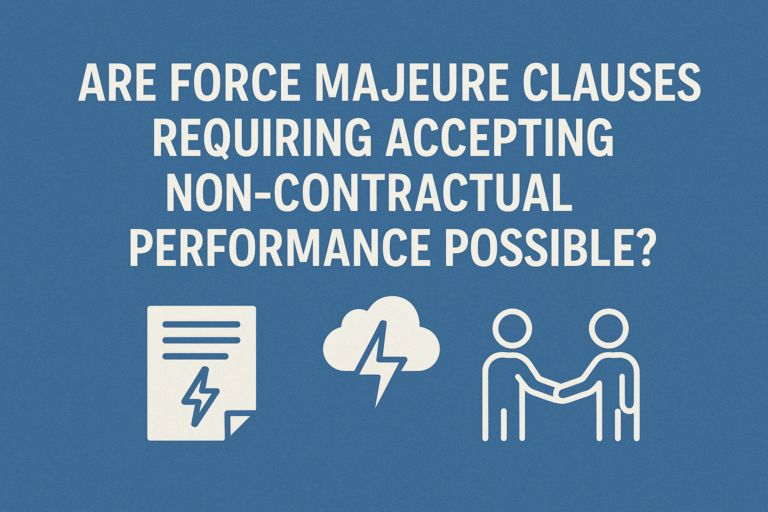About Force Majeure and Reasonable Endeavours 🌍
In contracts, force majeure provisions are essential since they let parties off performance in case unanticipated events arise. Many such clauses have a “reasonable endeavours” proviso, which mandates the aggrieved party to take reasonable action to overcome the consequences of the incident. Can this proviso, however, force the impacted party to accept a non-contractual performance—that is, a performance deviating from the contract terms? The 2024 decision of the UK Supreme Court in RTI Ltd v MUR Shipping BV ([2024] UKSC 18) offers a clear response, therefore resolving this intricate matter in commercial law.
RTI v MUR Shipping Background 🚢
The argument in RTI v MUR sprang from a 2016 contract of affreightment between MUR Shipping BV (shipowner) and RTI Ltd (charterer) for bauxite transportation from Guinea to Ukraine. The deal called for US dollar freight payments. US sanctions on RTI’s parent firm in April 2018 likely resulted in intermediary bank limitations delaying US dollar payments. Under paragraph 36 MUR issued a force majeure notice delaying vessel nominations as the sanctions hindered timely payments ([2024] UKSC 18, paras 5–9).
MUR insisted on US dollar payments and turned away RTI’s offer to pay in euros, including any conversion fees. Then RTI chartered replacement boats, paid expenses, started arbitration claiming damages for MUR’s breach. The arbitrators decided that MUR could not rely on the force majeure clause since accepting RTI’s euro offer would have surmounted the payment delays without negative effect on MUR (para 11). Different rulings by the High Court and Court of Appeal resulted in a Supreme Court appeal.
Question: Force Majeure Clause 📝
Among other conditions, clause 36 of the contract described a force majeure event as one that, “cannot be overcome by reasonable endeavors from the Party affected” (para 4, clause 36.3(d)). The Supreme Court looked at whether MUR had to accept RTI’s non-contractual offer in euros to get over the payment delays connected to sanctions.
Key Principles Ruling of the Supreme Court
Absent clear language, a reasonable endeavours proviso in a force majeure clause does not require the affected party to accept non-contractual performance ([2024] UKSC 18, para 103), Lords Hamblen and Burrows (with Lords Hodge, Lloyd-Jones, and Richards agreeing) concluded in a unanimous decision delivered on 15 May 2024. Key ideas are:
Reasonable efforts proviso serves to guarantee that the force majeure event responsible for the failure to fulfill is causal. This calls for actions to preserve contractual performance, not to replace another, non-contractual performance (paras 35–39). In this instance, the euro offer did not overcome the banking delay obstacle and contractual performance necessitated payment in US dollars (para 39).
Parties are free to reject non-contractual performance and to create on their own contract. Unless specifically agreed upon, requiring acceptance of non-contractual performance violates this principle (paras 41–42).
MUR had a contractual right to pay in US dollars, clearly for valuable rights. Giving up such a vital right calls for unambiguous contractual wording; clause 36.3(d) lacks this (paras 43–45).
Certainty in business Contracts: Accepting non-contractual performance adds uncertainty, therefore compromising the predictability that is so essential in business law. RTI’s method—requiring no harm and producing the same outcome—raises difficult factual questions (e.g., defining “detriment,” or “purpose”) that are unworkable for instantaneous decision-making (paras 47–55).
Reversing the majority ruling of the Court of Appeal, which had concentrated on the term “overcome,” the Court let non-contractual performance if it averted negative consequences without benefit (paras 18–21). The Supreme Court underlined that the matter is one of general principle rather than peculiar to the language of paragraph 36 since reasonable efforts provisos are typical of force majeure provisions (paras 26–29).
Authorities Support 📚
The Court concluded from past decisions strong implicit support:
Though directed was reasonable, an exclusion clause in Bulman & Dickson v Fenwick & Co ([1894] 1 QB 179) did not mandate charterers to waive their contractual right to unload at a strike-bound berth (paras 60–65).
Vancouver Strikes Case ([1963] AC 691): Charterers were not obliged to exercise choices to load alternative cargo during a strike, therefore preserving their ability to insist on contractual performance (paras 66–75).
RTI’s relied-upon cases—B & S Contracts ([1984] ICR 419)—were unique. Early contractual payment was the offer in B & S, not non-contractual performance, and hence not similar (paras 76–82). As they address remedies or default legal concepts rather than contractual performance under force majeure, cases on mitigating (Payzu v Saunders [1919] 2 KB 581) and frustration (The Eugenia [1964] 2 QB 226) were likewise declared irrelevant.
Consequences for Business Contracts 📈
The RTI v MUR decision gives companies direction:
Strict Contractual Compliance: Unless the contract specifically calls for differently, parties can insist on contractual performance in force majeure circumstances.
Tying reasonable efforts to contractual performance helps the choice to avoid complicated searches into “detriment,” or “purpose,” hence improving predictability (para 57).
Parties who want non-contractual performance in force majeure occurrences have to incorporate clear, unambiguous language in their contracts (para 59).
See more about force majeure clauses: Force Majeure in Contracts.
Notes and Final Thought 🌟
The RTI v MUR ruling of the UK Supreme Court shows that unless explicitly specified, the reasonable efforts proviso of a force majeure clause does not demand accepting non-contractual performance. This decision supports freedom of contract, the requirement of unambiguous language, and the need of confidence in business transactions. If the provisions of the contract are clear, businesses can rely on their contractual rights without worry of being forced to accept alternative performances.
From where you stand?Should force majeure clauses provide more room for non-contractual remedies? Your ideas are below. Subscribe to our blog to have more legal insights.




